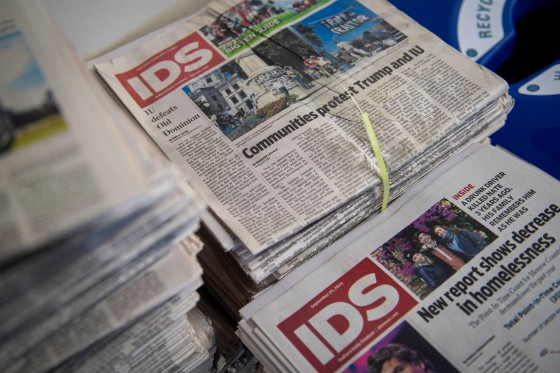Indiana University has fired its director of student media amid growing tension between the school and the student newspaper over what content was allowed in the print edition.
Director of student media Jim Rodenbush, an adviser to the Indiana Daily Student, confirmed to NBC News that he was fired Tuesday. His firing came hours before the school instructed IDS to end all print publication, according to The Indianapolis Star.
A university spokesperson said in an emailed statement Tuesday that the school "is committed to a vibrant and independent student media ecosystem" and that resources shifted "from print to digital media, prioritizing student experiences that are more consistent with today’s digital-first media environment while also addressing a longstanding structural deficit at the Indiana Daily Student."
"Editorial control remains fully with IDS leadership, and the university will continue to work closely with them to ensure the strength, sustainability, and independence of student media at IU," the spokesperson said.
The spokesperson said the university does not comment on personnel matters.
A termination letter, provided by Rodenbush, says he was fired because his "lack of leadership and ability to work in alignment with the university’s direction for the Student Media Plan is unacceptable." It also says that leadership "lost trust in your ability to lead and communicate appropriately on behalf of the university."
Rodenbush said that about a year ago, the university and the Media School announced that IDS would reduce its print frequency from weekly to seven issues per semester. He was told that the school wanted to focus on "special" print editions because "those are traditionally our highest generators of revenue," he said in a phone call Thursday.
The directive was implemented in the spring semester. Rodenbush said that students published the special editions in the spring the same way they had always done: a themed insert added to the regular print newspaper.
"We did that for seven issues. The entire semester passed, and nobody said anything to us," he said.
But in the fall semester, Rodenbush said he began to receive pushback from administrators and was told that the print newspaper could not include news content. The paper's website still publishes news.
Rodenbush said that in his role, he provides guidance to IDS staff but cannot tell them what to print.
He said he told the newspaper's editors that administrators wanted news content removed from the print paper, but the Indiana Daily Student did not make the change.
"They’re very locked into the idea that this is student-led, student-produced, and that the choices are their choices," Rodenbush said of the editors. "They understood that this was bad and unprecedented, but they also never wavered, and I wouldn’t expect them to."
Mia Hilkowitz and Andrew Miller, the paper’s co-editors-in-chief, said Thursday that they did not cut content from the paper because they want to maintain editorial independence. They said they believe Rodenbush was fired "after he did the right thing by refusing to censor our print edition."
"If IU can irrationally justify censoring stories as 'business decision,' what stops them from applying this thinking to the news and investigative stories that run on our website and social media? IU has no legal right to dictate what we can and cannot print in our paper," they said in an emailed statement.
In an online letter Tuesday, they accused the school of "unlawful censorship."
A print edition was scheduled to hit campus newsstands Thursday. The paper instead shared a digital copy of it.
"CENSORED" is written on the front page in capitalized red letters.
"This is not about print. This is about a breach of editorial independence," reads the text underneath, followed by a message from the paper’s co-editors-in-chief.
At the bottom of the page is an image of an empty IDS news rack.
Inside are articles about school sports, filmmakers fighting for free speech, the "science of drinking behaviors," the history of the university’s homecoming court and the homecoming weekend event schedule.
Billionaire entrepreneur Mark Cuban said on X that he gave money to the university’s general fund for the newspaper last year "so they could pay everyone and not run a deficit." He added that he gave more money than what the school asked for.
"Not happy. Censorship isn’t the way," he wrote.
David Reingold, chancellor of Indiana University Bloomington, said in a statement Wednesday that the school is "firmly committed to the free expression and editorial independence of student media."
"The university has not and will not interfere with their editorial judgment," he said in an emailed statement.
He reiterated that the decision to end the print newspaper was made to address financial challenges with the paper and to prepare "students for digital-first careers."
"To be clear, the campus’ decision concerns the medium of distribution, not editorial content," he said. "All editorial decisions have and will continue to rest solely with the leadership of IDS and all IU student media. We uphold the right of student journalists to pursue stories freely and without interference."
